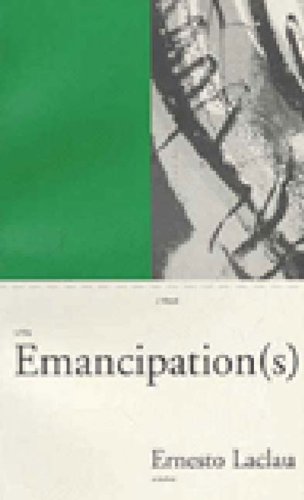Emancipation(s)
Ernesto Laclau
BOOK REVIEW

In an era where the very notion of freedom is contested and dissected through myriad lenses, Emancipation(s) emerges as a critical intellectual beacon. Written by the brilliant Ernesto Laclau, this work delves into the intricate and often perplexing terrains of political theory and identity, unraveling the fabric that binds us to concepts of liberation and authority.
Unlike traditional discourses on emancipation, Laclau's text does not merely offer a prescription for freedom; instead, it invites you to confront the complexities that underpin it. This is not just a treatise; it's a potent exploration of the political landscape that forces you to wrestle with your own understanding of autonomy. Can you feel the pulse of urgency? With every page, Laclau compels you to recognize that emancipation is not an absolute state-it is dynamic, a relentless process fraught with contradictions.
Laclau challenges the reader to reflect on the historical contexts that shape our understanding of freedom. He articulates how different political movements have embraced varying narratives of emancipation-each tinged with its own ideology, each promising liberation yet often reconstituting old forms of subjugation. The tension is palpable as he navigates through revolutionary fervors, democratic aspirations, and the stark realities of power dynamics. It's as if you're witnessing the ebb and flow of revolutionary spirit, from the French Revolution's thunderous cries for liberty to contemporary struggles for social justice.
The real beauty of Emancipation(s) lies in Laclau's ability to intertwine theory with the visceral experiences of people yearning for freedom. It's not just about battling oppression; it's about understanding how identities are formed and reformed in the throes of this struggle. Reader sentiments resonate strongly; some laud Laclau for deconstructing traditional paradigms and pushing the boundaries of political thought, while others argue that his theories can be abstract, mingling with ambiguity. This dichotomy renders the discourse vibrant, igniting debates that echo well beyond academic circles.
Moreover, the work's impact is felt in its reach, inspiring various activists, scholars, and political theorists who navigate the complex interplay of identity politics and the ongoing quest for emancipation globally. Think of figures influenced by Laclau-scholars who sought to apply his theories in real-world political movements, furthering discussions on populism, identity, and democracy. Does it not strike you how Laclau's insights resonate in contemporary uprisings, where movements capitalize on a shared sense of injustice, transforming personal grievances into collective action? The ramifications are profound.
What elevates Laclau's argument is his unwavering insistence on the importance of context. True emancipation cannot be divorced from the socio-political landscape that cultivates it. As you engage with his text, you are reminded that every claim to freedom exists within a socio-historical framework, and to ignore this is to strip the narrative of its richness.
Yet, this rich tapestry of considerations may leave some feeling unmoored-lost in the labyrinth of Laclau's philosophical explorations. Critics have pointed out that while his depth of insight is remarkable, the abstract nature of his arguments can leave the practical implications of emancipation hanging, akin to a fascinating theory disconnected from actionable steps.
Still, this is where the treasure lies! Emancipation(s) is not merely about answering questions-it's about provoking them! It's about confronting your own assumptions about power, consent, and the very nature of liberation. It grabs you by the collar, shaking you until you rethink what it means to be free in a world marred by ongoing struggles for justice.
As you dive into Laclau's electrifying prose, remind yourself: freedom is not a destination-it's the journey. And this journey, as Laclau masterfully elaborates, is fraught with complexities, challenges, and above all, the potential for profound transformation. Every reader, whether you lean towards the revolutionary or the cautious, must face the heavy truth Laclau presents: the fight for freedom is as much about understanding our past as it is about forging our future.
Leave no stone unturned in your quest for comprehension, for Emancipation(s) is not simply literature; it is an intellectual call to arms, a powerful invitation to rethink, reshape, and reclaim what it means to be truly free.
📖 Emancipation(s)
✍ by Ernesto Laclau
🧾 134 pages
1996
#emancipations #ernesto #laclau #ErnestoLaclau